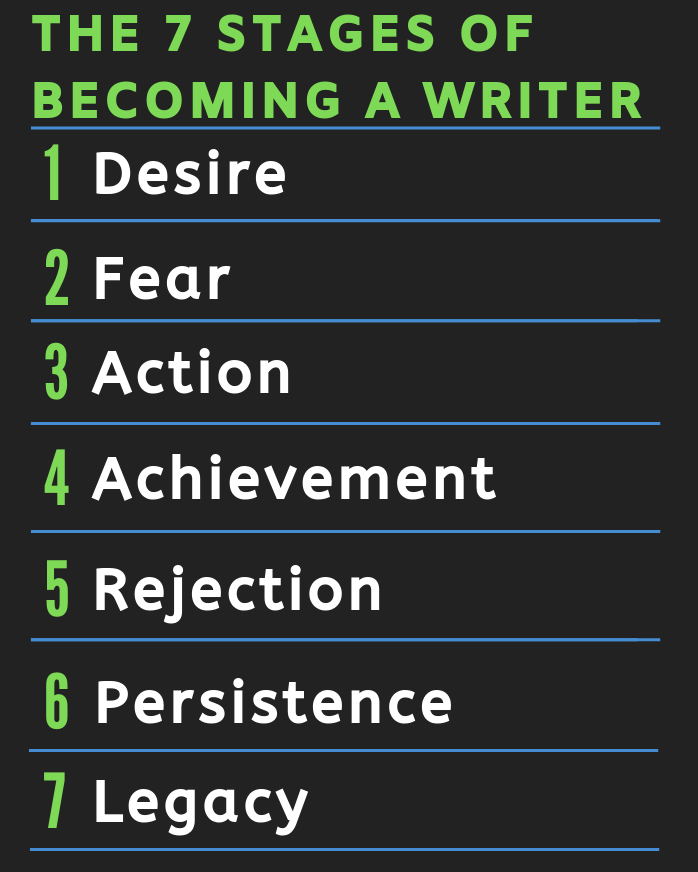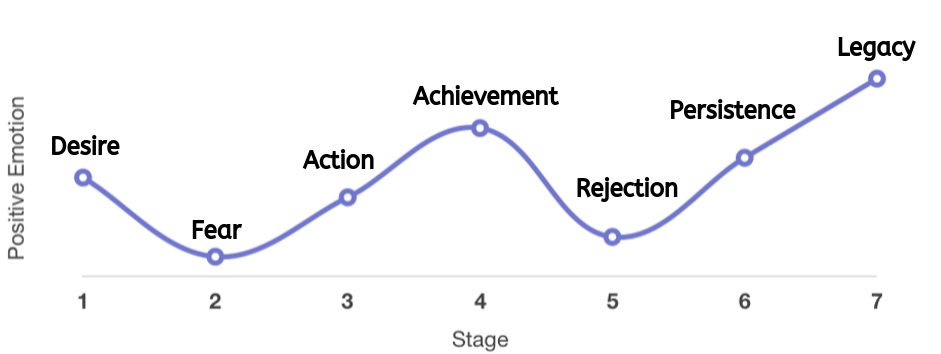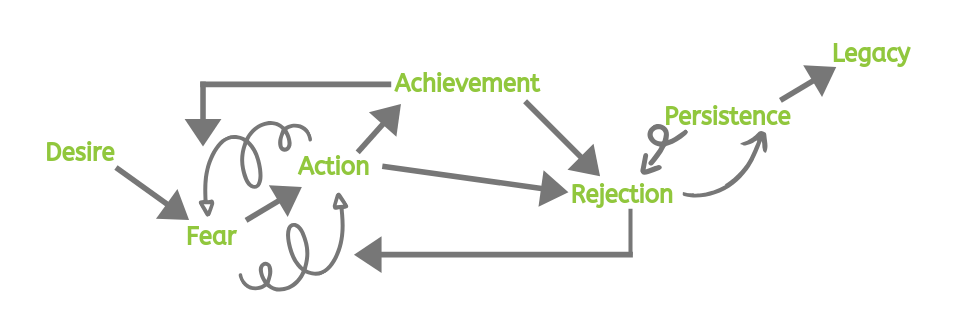The 7 Stages of Becoming a Writer
I recently noticed that every writer struggles with the same demons.
Seasoned writers like Stephen King and Anne Lamott express the same fears as newbies who tremble to click “Publish” on their first article.
After reading the same themes in dozens of books and articles, I’ve developed a working theory: there are seven stages to becoming a writer, and some of those stages are quite uncomfortable.
Although I will discuss these stages in regard to writing — because that’s what I know — I believe they also apply to other creative professions like music, art, photography…you name it.
The stages are fluid, which we’ll discuss further at the end of this article. Don’t expect a straight march from one stage to the next because it doesn’t work like that.
There are no direct flights to Success — you’ll need to make pitstops in Des Moines, Cleveland, and Detroit. That’s just how it goes.
But from what I’ve seen, every writer progresses through the same seven stages at some point in their journey.

Stage #1 — Desire
You decide that you want to start writing. You feel a spark of passion — maybe even romanticism — at the prospect of becoming a writer.
Right now, the idea is just that — an idea.
At this point, a physics professor would say your “potential energy” is high, but your “kinetic energy” is zero. You have revved up the engine, but your speedometer is pointing to the big zero.
What will becoming a writer involve? Who knows? It’s too early to tell.
All you know right now is that you want to write. You’ll figure out the rest along the way.
Stage #2 — Fear
You’ve revved your writing engine, but you realize that you’re petrified to drive the car. You don’t know what you’re doing, and you don’t know where you would even drive the car if you mounted the courage to hit the gas pedal.
After all, what if you crash? What if people — even your friends and family — mock your writing?
Come to think of it, you’ve seen countless examples online of people leaving cheeky comments on writers’ blog posts and articles. You’ve read an upsetting number of negative book reviews — some of which castigate the writer as a “sham” or “poser.”
That could be you if you started to write.
Maybe it’s not worth it.
Maybe writing should be reserved for all of the “geniuses” out there who were born with some gift you never received.
You decide that if you’re going to write, it will happen sometime in the future. Sometime when you’re smarter. Sometime when you have thicker skin. Sometime when you have more time.
Even though you sure as hell don’t know how to drive this car, maybe “Future You” will figure it out later.
Stage #3 — Action
You stumble upon an inspiring quote, story, or book that says no one knows what they’re doing when they begin writing.
Hmmm.
Something clicks. Maybe there’s no such thing as a “genius” or “born writer.” Maybe writing is like any other craft: you start doing it and learn as you go.
You begin to write. You publish your first article.
You know your writing isn’t good yet, but you feel good about having taken action. The car is moving now.
You may not know where you’re going, but it sure feels good to be behind the wheel. For now, you’re an enthusiastic explorer without GPS — driving in whatever direction you desire. And wandering feels good. It’s empowering.
“Writing a novel is like driving a car at night,” says E.L. Doctorow. “You can see only as far as your headlights, but you can make the whole trip that way.”
Stage #4 — Achievement
You experience some initial success.
Maybe one of your articles gets curated or featured on the homepage of a major publication. Maybe one of your co-workers tells you they read your latest article and they think you’re the next Salinger. Maybe someone comments to say that your article pulled them out of a dark place.
You bask in the glow of your own awesomeness.
Others are beginning to recognize you as a writer. You feel like you have begun to earn the mantle, and you wear it proudly.
Stage #5 — Rejection
You experience a setback.
A couple of trolls comment on one of your articles that your argument doesn’t make sense. Or you pour ten hours into an article, only to have it rejected by five publications. Or you experience writer’s block and lose confidence in your abilities.
You begin to wonder if you’ll ever again write an article as successful as _____ post that you published a few months ago.
Maybe your best days are behind you, as are the fickle fairies who distribute beginner’s luck.
You feel like you’ve run out of gas. You question whether you should continue.
Stage #6 — Persistence
You will yourself to succeed. Forget the haters. This is your calling.
Whereas you previously published two articles per month, you decide to triple your output to break through the barriers you’ve been facing.
You decide that nothing will prevent you from becoming a notable writer. You put in hours that no one will see to create work that no one can match.
You put your head down and you keep writing.
Stage #7 — Legacy
You’ve pushed through the rejection and resistance time and again. Your persistence has enabled you to set up a basecamp on the hill of success.
You begin to see deeper traces of the impressions you’ve left upon readers and other writers. You win an award that recognizes your writing prowess. Your favorite writer references your work in their newest book.
You still face adversity and criticism, still struggle with self-doubt, and still have ambitions you have not yet achieved. But you have left a legacy that others will follow. Your words on paper and pixels on screen have somehow left a dent in the universe.
Setbacks Are Part of the Process
Every person who sets out to become a writer must strap in for a roller coaster ride of highs and lows, successes and disappointments, conquests and concessions.
Nothing worth doing comes without difficulty. No successful writer ever attained literary heights without first wrestling with personal demons like fear and rejection. Setbacks are part of the path.

The Fluidity of the 7 Stages
The truth is, you won’t waltz through the stages from one to the next. They’re not steps up a ladder. They’re fluid stages that bleed into each other.
You will taste initial success (Achievement), then fall back into Fear. You will push through difficulty (Persistence), then get shut down again (Rejection), which will prompt you to question whether to continue writing (Fear).
How we think the writing process works:

How it actually works:

Writing is a noble quest of personal development.
Because the road to writing success passes through stages like fear and rejection, the very act of writing forces us to turn inward and reconcile our own insecurities.
Regardless of the challenge you are facing right now, take comfort in the fact that you are not alone. Every single writer has been where you are today. The strong survived; the weak perished. Choose to stand with the strong.
Writing refines character and chisels courage. Its virtue comes from its challenges — challenges that every writer is bound to face in greater measure the longer they persevere.
Will you push through the inevitable setbacks?
Will you persist and leave a legacy?






